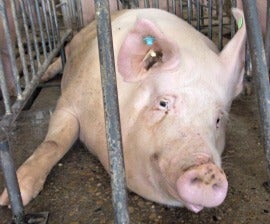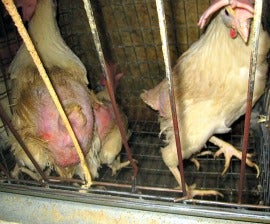-

Sows are often treated as piglet-producing units at factory farms that use intensive confinement systems. The HSUS
-

Battery cages prevent normal behavior and lead to many physical ailments. The HSUS
As of 2013, there has been increased global attention to the treatment of farm animals, especially the welfare of breeding pigs and egg-laying hens.
Pigs are intelligent, highly social animals, yet many female breeding pigs in Latin America are treated as piglet-producing units at factory farms that use intensive confinement systems. These sows suffer through rapid cycles of impregnation, giving birth, and nursing. During their four-month pregnancies, many are kept in “gestation crates,” individual metal stalls, so small the animals can’t even turn around. This happens pregnancy after pregnancy for their entire lives, adding up to years of virtual immobilization.
Additionally, tens of millions of egg-laying hens are also confined in small, wire enclosures known as battery cages. Battery cages are so cramped that the hens cannot even fully stretch their wings. Battery cages prevent nearly all normal behavior, including nesting, perching, and dustbathing, all of which are critically important to the hen. These cages also deny the birds normal movement to such an extent that the hens may suffer from physical ailments, including bone, reproductive, and liver problems.
Victories
HSI welcomes important advances that have taken place both in Latin America and globally towards the elimination of gestation crates and battery cages:
- Shortly after a ban on gestation crates (for all except the first four weeks of pregnancy) came into effect throughout the whole European Union on January 1, Smithfield Foods, the largest pork producer in the world announced that gestation crates will be eliminated from its jointly-owned facilities in Mexico by 2022;
- Marriott International, with hotels throughout Latin America, committed to eliminating gestation crates and battery cages from its global pork and egg supply chain by 2018 and 2015, respectively;
- DineEquity, one of the world’s largest full-service restaurant companies and owner of Applebee’s and IHOP, committed to eliminating gestation crates from its global pork supply chain by 2020;
- Several restaurants in Brazil and Costa Rica adopted cage-free egg procurement policies.
Next steps
HSI will continue working closely with food retailers, corporations, and governments throughout Latin America to end the intensive confinement of farm animals in gestation crates and battery cages in the region.
You can stand up for farm animals every time you sit down to eat. Take a look at our Guide to Meat-Free Meals to learn how you can help.
